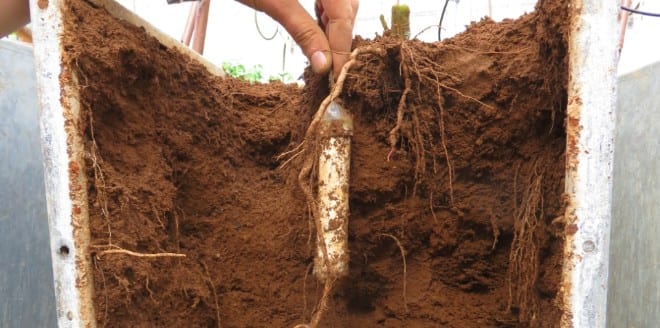Nitrate (NO3) is a naturally occurring form of nitrogen in soil that is created when nitrification – the conversion of ammonium into nitrate –
occurs. Nitrate is used as food by plants for growth and production, and its level in the ground varies widely, depending upon the type of soil, climate conditions, rainfall and fertilizing practices.
While nitrogen, potassium and phosphorus are the three major nutrients that plants need to grow successfully, nitrogen is responsible for the development of leaves. Plants use nitrogen in the form of nitrates, which is nitrogen mixed with oxygen.
About 78% of the earth’s atmosphere is composed of nitrogen, but it is not in a form available to most plants (with the exception of some nitrogen-fixing legumes that harness it with a bacterial symbiosis). Therefore, fertilizer is applied to crops in forms that are readily taken-up by plant roots, as nitrate and ammonium (NH4).
Natural nitrate levels in groundwater are generally very low, but excess application of fertilizers in agriculture often result in the leaching of nitrate from the soil to places where water is naturally stored underground. Nitrates are toxic to humans, causing problems with oxygen absorption. They do the same thing in waterways, causing eutrophication – or de-oxygenation – of water, which has adverse effects on aquatic ecosystems and the environment.
Excessive levels of nitrate in water is one of the main reasons for the disqualification of drinking water, which causes a worldwide environmental problem. Over-fertilization makes it difficult to eliminate in preventing nitrate leaching. It’s not only a waste of product and money, but also an environmental hazard. Managing fertilizer inputs precisely can go a long way towards maximizing value for money on inputs, as well as taking care of the local environment.
Fertilizer should be applied only when plants need it. Applying fertilizer at the wrong time is a common mistake that is easily corrected with the right information. As nitrates move with water, proper irrigation management based on an understanding of the topography and soil composition of the cultivated area as well as the needs of the particular crop can help manage nitrate leaching.
Now, BGN Technologies – the technology transfer company of Ben-Gurion University of the Negev (BGU) in Beersheba – has introduced a new technology for direct, real-time and continuous measurement of nitrate in the soil.
The invention, developed by Prof. Ofer Dahan of the Zuckerberg Institute for Water Research (ZIWR), Prof Shlomi Arnon of the department of electrical & computer engineering and ZIWR doctoral student Elad Yeshno, relies on an optical nitrate sensor that is based on absorption spectroscopy. The technology enables continuous, real-time, measurement of nitrate in the soil pore-water and is highly resistant to harsh chemical and physical soil conditions.
The sensor can detect nitrate concentrations in the range of tens to hundreds of parts per million, which is the range relevant for growing crops. Its ability to continuously monitor soil nitrate levels produces a highly detailed portrayal of the rapidly changing concentrations of nitrate in the soil solution.
“Current methods for measuring soil nitrate are cumbersome, labor-intensive, and do not provide real-time indication on the actual concentration of nutrients in the soil,” said Dahan. “Our invention, which enables real-time monitoring of soil nitrate levels, can supply farmers with valuable data on the amount nutrient availability for the crops,” Arnon added, “Our solution enables optimization of fertilizers application thus preventing over-fertilization, as well as economizes irrigation and reduces water resources pollution.”
Shirley Sheffer Hoffman, a senior vice president for business development, water, energy and agriculture at BGN Technologies, commented: “This is another example of the cutting-edge multidisciplinary research preformed at the Jacob Blaustein Institutes for Desert Research of BGU focused on various water, energy, food and ecological problems under different environmental condition, in collaboration with researchers at the electrical and computer engineering department of the university. This promising project received funding from the Israel Innovation Authority, and now BGN Technologies is seeking an industry partner for its further development and commercialization.”
BGN Technologies brings technological innovations from the lab to the market and fosters research collaborations and entrepreneurship among researchers and students. To date, it has established over 100 startup companies in the fields of biotech, hi-tech and cleantech as well as initiating leading technology hubs, incubators, and accelerators. Over the past decade, it has focused on creating long-term partnerships with multinational corporations such as Deutsche Telekom, Dell-EMC, IBM, PayPal, and Bayer, securing value and growth for BGU as well as for the Negev region.
Source: Israel in the News

